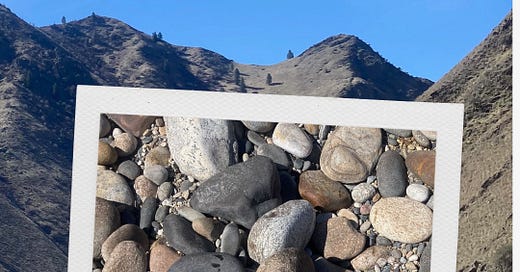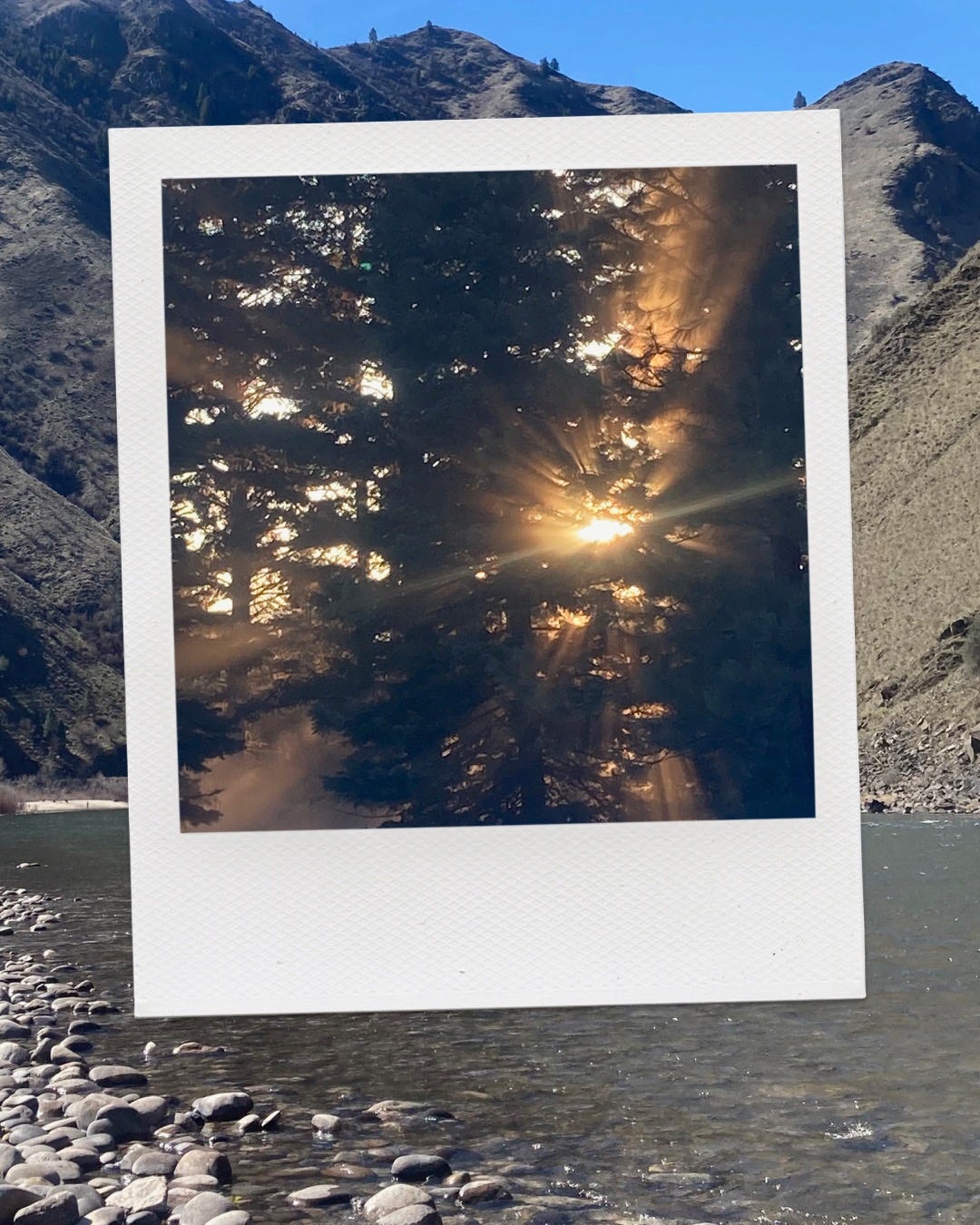*A bit of writing business before I dive into some assorted storytelling: The two Spring 2025 cohorts of DIVE kick off on April 1 [Tuesday cohort] and April 3 [Thursday cohort], and there’s still a bit of time to jump off the fence and join us for what I promise will be a wonderfully inspiring and generative writing community for the next three months (and beyond). You can find more info and registration here. Questions? Please ask them.
In a few weeks my sister and her family are traveling to Ireland. It’s a first-ever trip for all five of them, even as it’s also technically a homecoming of sorts. My mother’s side of the family is comprised of Mooneys and McCoys who originally called Ireland home for generations; my great-great grandparents only left to escape famine. They wanted to live. They landed in the United States like so many immigrants across so many generations have: in search of a better life. They wanted a fresh start and an opportunity to exist freely and abundantly and within beloved community.
My dad’s side of the family encompasses a similarly devastating and inspiring immigration story. During World War I Lithuania found itself on the front lines of the Eastern Front, and my great-grandparents made the undoubtedly difficult and hope-filled decision to trade the only home they’d ever known to protect themselves and the family they were building together. Their eldest daughter was born in the United States in 1922. My grandfather was born in Seekonk, Massachusetts in 1929, the wildland-loving son of hardworking and community-minded immigrants who made their living running a small farm.
I think about my family history—my complicated and beautiful ancestry—often. I’m more than a little fascinated by it, truth be told. I’ve been dreaming of visiting Ireland and Lithuania for what feels like decades (and might very well be). They’re the two places on this earth I still most want to see and spend time learning more about. [A “redemption” trip to Norway is a close third, especially after making the heartbreaking decision to pull the plug on a two-week-long retreat + exploratory adventure I’d booked with my partner and dear friends there in the summer of 2023 (an essentially torn Achilles made the decision for me, really).]
When my great-grandparents and great-great-grandparents respectively traveled to the United States, they didn’t need visas, or green cards, or any other “documentation” to enter the country; passports didn’t exist until the 1920s [and even then, single women weren’t eligible to have their own]. They bought a boat ticket and made a perilous journey by sea; when they arrived they were given social security numbers, no questions asked.
It’s quite a study in contrasts: My ancestors establishing themselves in the United States over a hundred years ago and likely not much considering maintaining or even seeking dual citizenship once they immigrated (they were Americans now, and proudly so)—even as I’d feel notably grateful for an Irish and/or Lithuanian passport right about now. Even as I’d love to feel welcome as an American in any number of countries not rapidly and intentionally descending into a fascist, totalitarian state.
It’s something else I find myself thinking about often: What our world might look like if all of our borders were fluid instead of fixed.
What would it mean to move about the world freely as if we all belonged to the earth?
What if we could focus on being in relation to our physical surroundings vs. worried about boundary lines and borders and who has the “right” to be here, or there, or anywhere?
What would it look like if we spent less time extracting and more time building, welcoming, sharing?
What if we as humans collectively and globally stopped being concerned about what we can take from any given place, what if we pivoted intentionally and drastically away from what can be extracted for capitalist gain and started thinking more about what we can collectively give back to the earth and the myriad creatures we share it with?
I definitely have more questions than anwers these days. I’ve been trying to do more listening than talking as of late. It feels important.
What I know:
When we maintain borders with violence, borders become violence.
My maternal grandparents worked as public servants their entire lives in Spokane, Washington. My paternal grandfather joined the U.S. Air Force at the first opportunity, as soon as he turned 18. He served for years, was honorably discharged, and then re-enlisted after North Korea invaded South Korea in 1950.
None of my grandparents would have imagined feeling unsafe in their own communities, in their own country. I don’t think they would have imagined their grandchildren feeling unsafe in the United States during our lifetimes. And yet, that’s how so many of us, so many citizens, so many beloved immigrants, so many students and professors and medical professionals living and working and learning on assorted visas and holding a variety of passports feel throughout the country right now. I realize that’s how so many of our fellow humans have felt in this country since Day 1. I realize fascism has been an insidious cancer eating at the heart of our country since its imperialist inception.
So, what do we do about it?
I hope we keep listening. I hope we keep learning (and unlearning).
I hope we keep showing up. I hope as parts of the world continue to feel bleak, we continue to get bright.
I hope we walk outside and perpetually point our faces toward the sun and remember—as Mary Oliver reminds us in her poem “Invitation”—what a serious(ly beautiful) thing it is just to be alive on this fresh morning in this broken world.
I hope on the darkest days we can remember: There is so much power in community. There is strength in true solidarity. There is value in using our voices and our stories and our privilege and our respective and collective platforms for the good of all creatures, for the good of all of our fellow humans. I hope we can be brave.
I hope. I hope. I hope. I won’t stop hoping for a world where everyone is truly free.
*As always, recommended reading + writing prompts below.
RECOMMENDED READING FOR THE MONTH AHEAD
Books:
Recognizing the Stranger: On Palestine and Narrative by Isabella Hammad // This book is a speech Hammad gave at Columbia on October 7, 2023 and it’s a masterclass re: storytelling and using your voice. It’s also only ~90 pages long.
There Are No Accidents by Jessie Singer
Home is Not a Country by Safia Elhillo
Poetry:
“March” by Jessica Jiang
“we acknowledge ourselves” by Allison Akootchook Warden
REFLECTIVE WRITING PROMPTS FOR THE MONTH AHEAD
Family history. Write a short story (real or imagined) inspired by your family.
Chosen family. There's a beloved premise that family is what we make it—that as we get older we can choose our families by creating our own close-knit circles of community, whatever that looks like for each of us. Write about what chosen family looks like for you.
Community Care. Spend a few minutes thinking about what “community care” means to you. What sort of community are you craving? What and whom are you showing up for in your day-to-day life?
Alternate/additional prompts: What would you like to be doing more of in the month ahead? Is there anything you’d like to stop doing?
Conversation with an ancestor. Draft a conversation between yourself and someone in your family you never met. Feel free to ask questions and imagine how they’d answer them.
As always, I recommend sitting with each of these prompts for at least ten minutes at a time. Set a timer and try to keep writing without stopping or self-editing or even trying to steer yourself a certain direction. I’m a firm and longtime believer that when it comes to prompts like these, wherever you end up on the page is precisely where you’re meant to be.
Do you know someone who would benefit from receiving regular writing prompts to their inbox, who might delight in reading some intentional rambles about words and water and the power in finding our respective and collective (voices +) senses of place?
I’d love it if you’d share this post and Kerrtopia with them.
Kerrtopia is a free offering, though I've turned on paid subscriptions for this newsletter if you have the means to support it now or anytime in the future. It's not necessary to pay to read, but it is of course very much appreciated. I’ll likely be adding some special content for paid subscribers down the line. Thanks for reading, and for your ongoing support. I’m grateful you’ve found me here; I’m grateful we’re here together. You can also find me on Bluesky [not owned by fascist billionaires] and I’m still hanging tough on Instagram for now, for the community I’ve built over the years there. Feel free to reach out; I’d love to hear from you.








“When we maintain borders with violence, borders become violence.” I want to make a poster of this.